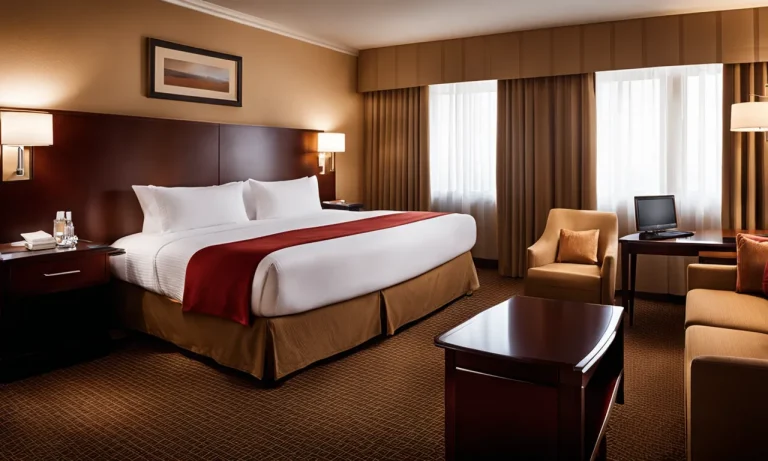Planning your stay at a hotel involves making a few important decisions, one of which is choosing between room only, bed and breakfast, half-board, and full-board options. This article focuses specifically on ‘half-board’. What does this term mean?
If you’re short on time, here’s a quick answer to your question: Half-board refers to a hotel service that includes not only the overnight stay, but also breakfast and one other meal, usually dinner, in the room price.
In this detailed guide, we will dive into the nuances of half-board accommodations, the benefits, potential drawbacks, and some factors to consider when choosing this type of hotel service.
Understanding Half Board Accommodations
When planning a vacation or business trip, it’s important to choose the right accommodation package to suit your needs and preferences. One popular option that many hotels offer is the half board package. But what exactly does half board mean?
What is Half-Board?
Half board is a type of accommodation package offered by hotels that includes both breakfast and one other meal, usually dinner, in the price of the room. This means that when you book a half board package, you can enjoy a delicious breakfast in the morning and a satisfying dinner in the evening without having to worry about finding a restaurant or spending extra money on meals.
This package is a great option for travelers who want the convenience of having meals taken care of during their stay. It allows you to start your day with a hearty breakfast before heading out to explore your destination, and then return to the hotel for a delicious dinner without the hassle of searching for a restaurant.
Difference between Half-Board and Other Packages
It’s important to note that half board is different from other accommodation packages such as bed and breakfast (B&B) or full board. While a B&B package typically includes only breakfast, half board includes both breakfast and dinner. On the other hand, a full board package includes all three meals: breakfast, lunch, and dinner.
So, if you choose a half board package, you’ll have the flexibility to explore local restaurants for lunch or try out different dining options during your stay. This can be a great way to sample the local cuisine and immerse yourself in the culture of your destination.
Before booking a half board package, it’s important to check the hotel’s specific terms and conditions to ensure that the included meals meet your dietary requirements and preferences. Some hotels may offer a fixed menu for dinner, while others may provide a buffet-style meal with a variety of options to choose from.
Also Read: What is a Bed and Breakfast Hotel?
The Benefits of Choosing Half-Board
Cost Efficiency
One of the major benefits of choosing half-board at a hotel is the cost efficiency it offers. With half-board, you typically pay for your accommodation and two meals a day, usually breakfast and dinner, at a fixed rate. This means that you can enjoy a variety of delicious meals without worrying about the additional costs of dining out for every meal. It can be a great option for travelers who want to stick to a budget or families looking to save money on their vacation expenses.
Food Quality and Convenience
When you opt for half-board, you can expect high-quality meals prepared by professional chefs. Hotels often offer buffet-style meals with a wide variety of options to cater to different tastes and dietary preferences. This allows you to try different dishes and explore the local cuisine without the hassle of searching for restaurants or worrying about finding suitable dining options. Additionally, having meals included in your accommodation package saves you time and effort, allowing you to fully relax and enjoy your vacation.
Choosing half-board can also be convenient for those who prefer to have their meals at the hotel. You don’t have to worry about making reservations or waiting in long lines at popular restaurants. Instead, you can simply head to the hotel’s restaurant at the designated meal times and enjoy a satisfying meal at your leisure.
According to a study conducted by TravelMag, travelers who choose half-board options save an average of 30% on their overall food expenses compared to those who dine out for every meal.
Furthermore, some hotels offer the flexibility to switch between lunch and dinner for their half-board guests, allowing you to plan your day’s activities without being tied down to specific meal times. This gives you the freedom to explore the destination and enjoy your vacation to the fullest.
Potential Drawbacks of Half-Board
While half-board can be a convenient option for many travelers, it is important to consider some of the potential drawbacks before making a decision. These drawbacks include limited food choices and less flexibility in meal times.
Limited Food Choices
One of the main drawbacks of opting for half-board at a hotel is the limited food choices available. With half-board, you typically have a set menu or a buffet-style option to choose from for your meals. While this can be a great way to sample different dishes and cuisines, it may not be suitable for those with specific dietary requirements or preferences.
For example, if you have dietary restrictions such as being vegetarian or vegan, you may find that the options provided for these dietary preferences are limited. Similarly, if you have food allergies or intolerances, it may be challenging to find suitable options within the predefined menu. In such cases, you may need to explore alternative dining options outside of the hotel.
Additionally, if you enjoy trying local restaurants and exploring the culinary scene of your travel destination, half-board may limit your ability to do so. You may feel restricted to eating at the hotel for your included meals, missing out on the opportunity to try local delicacies and experience the local culture through food.
Less Flexibility in Meal Times
Another drawback of half-board is the reduced flexibility in meal times. With half-board, your meals are typically scheduled at specific times and you may need to adhere to those timings. This can be problematic if you have a busy itinerary or if you prefer to have more control over your daily schedule.
For instance, if you plan to spend the entire day exploring a certain attraction or engaging in activities, you may find that the scheduled meal times do not align with your plans. This can result in either missing the included meal or having to rush through your activities in order to make it back to the hotel in time for your meal.
On the other hand, if you prefer to have a leisurely morning or if you like to sleep in and have a late breakfast, half-board may not be the ideal option for you. The fixed meal times may not align with your preferred routine, limiting your flexibility and potentially causing inconvenience.
It is important to weigh the convenience of having meals included against the potential drawbacks of limited food choices and less flexibility in meal times when deciding whether half-board is the right choice for your travel plans.
Factors to Consider When Choosing Half-Board
When booking a hotel, one of the options you may come across is “half board.” This term refers to a meal plan where your accommodation includes breakfast and one other meal, typically dinner, during your stay. It is important to consider a few factors when deciding whether to opt for half-board, as it can greatly impact your overall experience. Here are some key factors to keep in mind:
Your Travel Itinerary
One of the first things to consider when choosing a half-board option is your travel itinerary. If your days are filled with activities and you plan to explore the local area extensively, you may not have enough time to enjoy both breakfast and dinner at the hotel. In this case, it might be more cost-effective to opt for a room-only rate and explore local restaurants for meals. On the other hand, if you prefer a more relaxed itinerary and plan to spend a significant amount of time at the hotel, the convenience of having meals included can be a major advantage.
Food Preferences
Another important factor to consider is your food preferences. While half board typically includes breakfast and dinner, the specific offerings and variety of the meals can vary from hotel to hotel. If you have dietary restrictions or specific preferences, it is essential to check the hotel’s menu options and ensure they can accommodate your needs. Additionally, if you enjoy trying different cuisines and exploring local restaurants, you may prefer the flexibility of not being tied to the hotel’s meal options.
Budget Considerations
Budget is always an important consideration when planning a trip. While half board can be a convenient option, it is essential to compare the cost of the meal plan with the prices of local restaurants. Sometimes, the cost of eating out might be more affordable or offer a wider variety of choices. However, if the hotel’s half-board option provides excellent value for money and fits within your budget, it can be a great way to save on meal expenses during your stay. It is also worth considering if the hotel offers any special promotions or discounts for half-board guests.
Ultimately, the decision to choose a half-board option at a hotel depends on your individual preferences, travel itinerary, and budget considerations. By carefully considering these factors, you can make an informed decision that enhances your overall travel experience. Bon appétit!
Conclusion
Understanding what half-board means in a hotel context is essential for making an informed decision that suits your needs, preferences, and budget during your travel.
While half-board has its perks such as potential cost savings and convenience, it also has certain limitations. Hence, it’s crucial to consider your travel itinerary, food preferences, and budget before making a decision. After all, a well-planned and comfortable hotel stay forms an integral part of a memorable travel experience.






